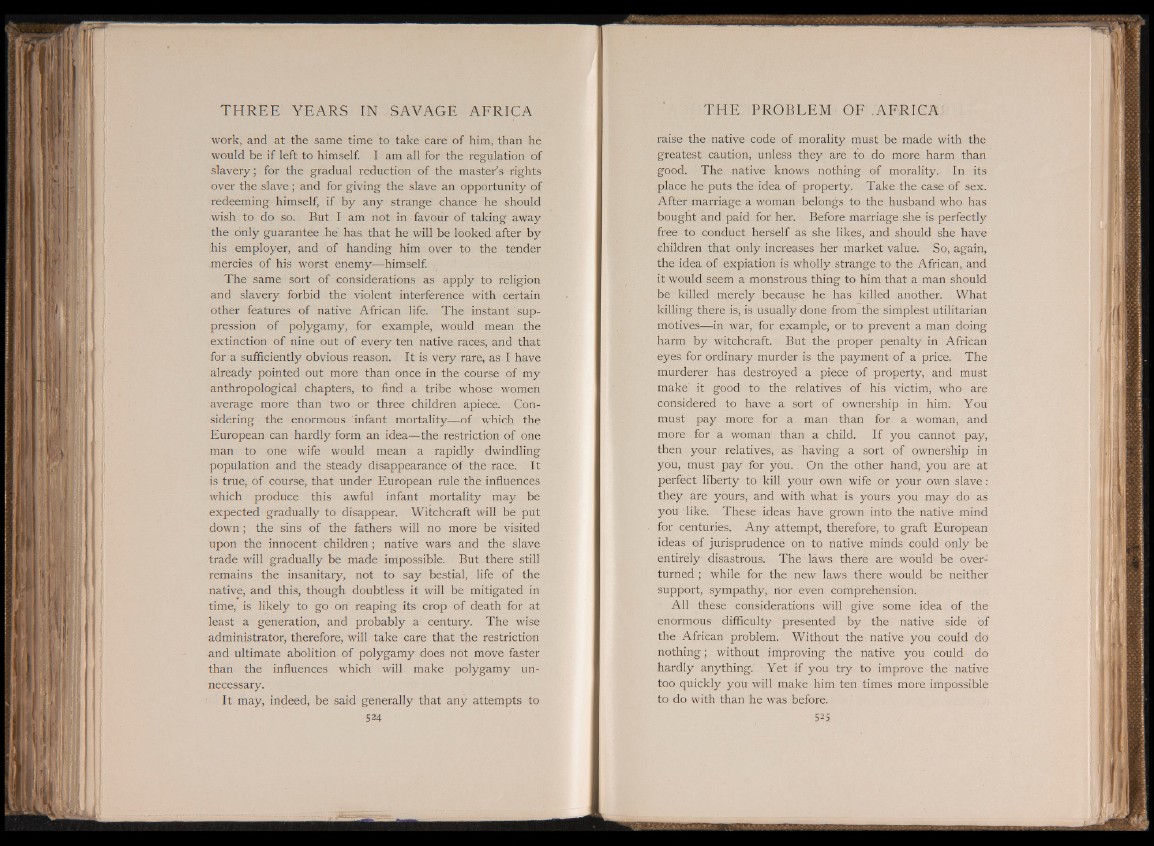
work, and at the same time to take care of him, than he
would be if left to himself. I am all for the regulation of
slavery; for the gradual reduction of the master’s rights
over the .slave; and for giving the slave an opportunity of
redeeming himself, if by any strange chance he should
wish to do so. But. I am not in favour of taking away
the only guarantee he has that he will .be looked after by
his employer, and of handing him over to the tender
mercies of his worst enemy.—himself.
The same sort of considerations as apply to religion
and slavery forbid the violent interference with certain
other features of native African life. The instant suppression
of polygamy, for example, would mean the
extinction of nine out of every ten native races, and that
for a sufficiently obvious reason. It is very rare, as I have
already pointed out more than once in the course of my
anthropological chapters, to find a tribe whose women
average more than two or three children apiece. Considering
the enormous infant mortality—of which the
European can hardly form an idea—the restriction of one
man to one wife would mean a rapidly dwindling
population and the steady disappearance of the race. It
is true, of course, that under European rule the influences
which produce this awful infant mortality may be
expected gradually to disappear. Witchcraft will be put
down; the sins of the fathers will no more be visited
upon the innocent children ; native wars and the slave
trade will gradually be made impossible. But there still
remains the insanitary, not to say bestial, life of the
native, and this, though doubtless it will be mitigated in
time, is likely to go on reaping its crop of death for at
least a generation, and probably a century. The wise
administrator, therefore, will take care that the restriction
and ultimate abolition of polygamy does not move faster
than the influences which will make polygamy unnecessary.
It may, indeed, be said generally that any attempts to
raise the native code of morality must be made with the
greatest caution, unless they are to do more harm than
good. The native knows nothing of morality. In its
place he puts the idea of property. Take the case of sex.
After marriage a woman belongs to the husband who has
bought and paid for her. Before marriage she is perfectly
free to conduct herself as she likes, and should she have
children that only increases her market value. So, again,
the idea of expiation is wholly strange to the African, and
it would seem a monstrous thing to him that a man should
be killed merely because he has killed another. What
killing there is, is usually done from the simplest utilitarian
motives-r—in war, for example, or to prevent a man doing
harm by witchcraft. But the proper penalty in African
eyes for ordinary murder is the payment of a price. The
murderer has destroyed a piece of property, and must
make' it good to the relatives of his victim, who are
considered to have a sort of ownership in him. You
must pay more for a man than for a woman, and
more for a woman than a child. If you cannot pay,
then your relatives, as having a sort of ownership in
you, must pay for you. On the other hand, you are at
perfect liberty to kill your own wife or your own slave r
they are yours, and with what is yours you may do as
you like.. These ideas have grown into the native mind
for centuries. Any attempt, therefore, to graft European
ideas of jurisprudence on to native minds could only be
entirely disastrous. The laws there are'would be overturned;
while for the new laws there would be neither
support, sympathy, rtor even comprehension.
• All these considerations will give some idea of the
enormous difficulty presented by the native side of
the African problem. Without the native you could do'
nothing; without improving the native you could do
hardly anything.' - Yet if you try to improve the native
too quickly you will make him ten times more impossible
to do with than he was before.